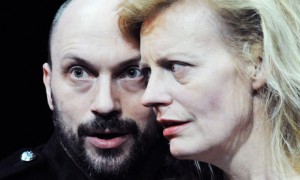I liked this production a lot more than Charles Isherwood does in the Times. I’m much closer to feeling the way Michael Billington does in the Guardian, when he calls it “an archetypal Cheek By Jowl production: spare, disciplined, purged of gore and gratuitous spectacle.” But more than anything I was fascinated by the two lead players. Billington complains, rightly, that it was hard in this production to tell Banquo from Macduff from anyone else, as they were all smothered in bland black. But I didn’t care much, because all the action was in the marriage.
 I mostly don’t like Harold Bloom’s pontifications on Shakespeare, but this production reminded me of his joke about the Macbeths being “the only happy marriage in Shakespeare.” The tension and chemistry between Will Keen’s diminutive Macbeth and his tall, blond, physically expressive wife, played by Anastasia Hille, drove this spare production. I left thinking that it would be a great challenge to put the show on with just two actors, him and her.
I mostly don’t like Harold Bloom’s pontifications on Shakespeare, but this production reminded me of his joke about the Macbeths being “the only happy marriage in Shakespeare.” The tension and chemistry between Will Keen’s diminutive Macbeth and his tall, blond, physically expressive wife, played by Anastasia Hille, drove this spare production. I left thinking that it would be a great challenge to put the show on with just two actors, him and her.
Part of that intensity was created by what the production left out: no visible witches or daggers or blood. The staging was abstract but also fast, with the next scene starting often with the last scene still on stage, which made for some great juxtapositions, including having a silent Lady Macbeth still on stage for the “cry of women” that announces her death.
These two performances made this Macbeth a rather brutal explosion of a marriage that can’t heal itself. Will Keen’s contained fury and trembling hands grasped eagerly for his wife during their first scene together, which featured more kissing that you might expect of an assassination plot. Keen’s soliloquies were often inventive — including an odd but resonant pause before “quickly” in “If ’twere done…” — but the best scenes, always, were between the couple, who always acted, even during public events such as the banquet scene, as if no on else mattered.
Some of the things left out you miss — the Weird Sisters, the dagger, more distinctive roles for Duncan and Banquo and the Macduffs. But the manic focus of this production revealed something about the play, about Cheek by Jowl, and about Keen and Hille. They need this murder, but Lady Macbeth is talking about more than just that —
Nor time, nor place
Did then adhere, and yet you would make both…
I won’t speculate about children or anything else. But it was fascinating to see a show that really takes the relationship between these two as the play’s heart. Shakespeare’s play mostly separates husband and wife after act 3, but this production insisted on keeping them together, right up until Macbeth’s “She should have died hereafter…”
The dead couple, in a slightly sentimental touch, lie together at the play’s end, toward the front of the stage, in front of the newly assembled Earls of Scotland. (No decapitated head gets shown off in this production.) An interesting touch.
[…] of Lady Macbeth, often the emotional high point of the play. The last great Macbeth I saw, by Cheek by Jowl in 2011, had me wanting a production of just the love story, with no one on stage but Him and Her. […]